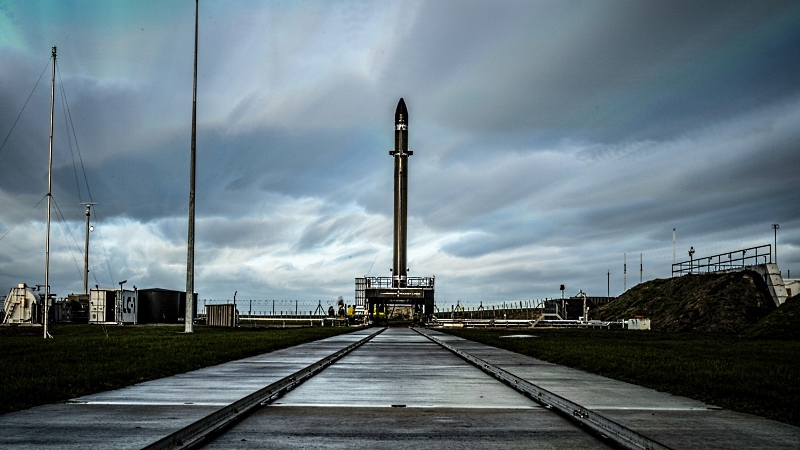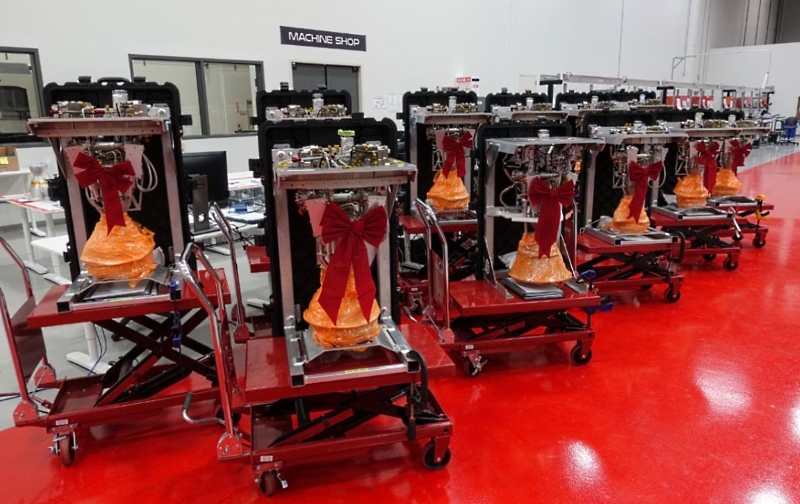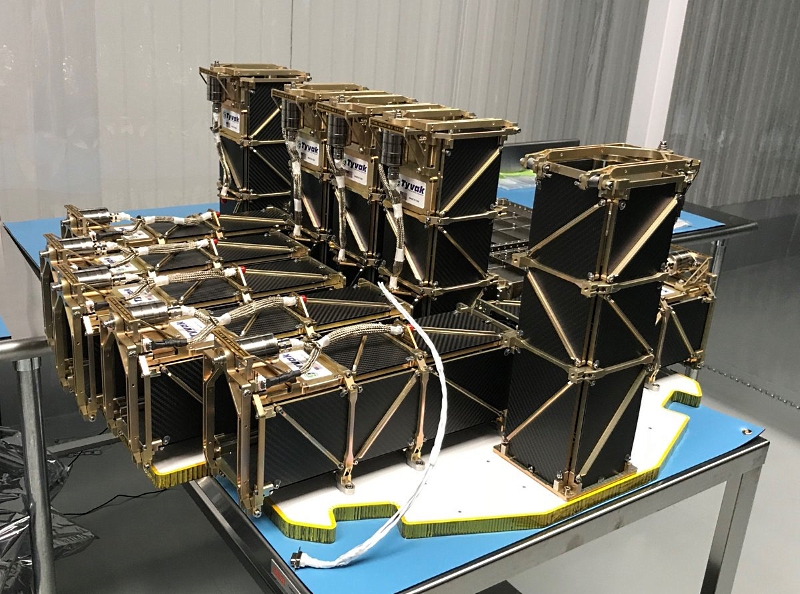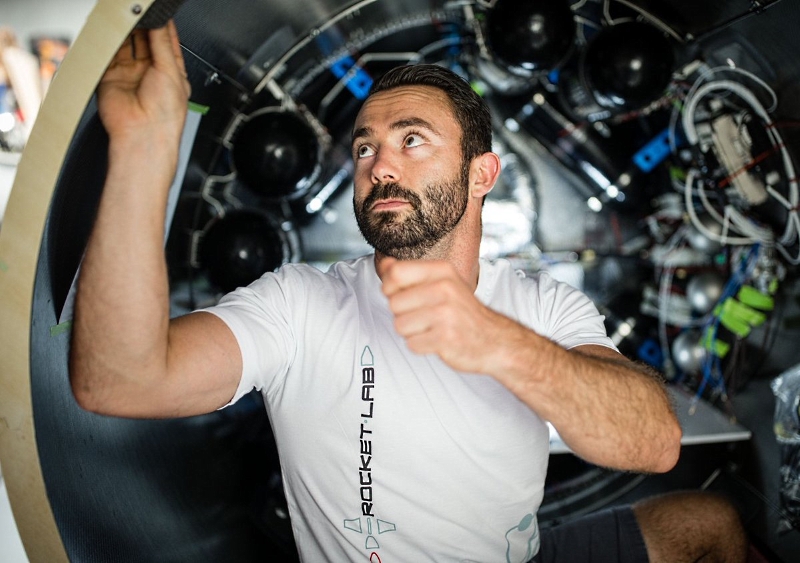Rocket lab repairs, expands and accelerates
The first commercial launch of the Electron rocket “It's time to do business” did not work out in June. The third attempt will be in November, and in parallel Rocket Lab does not lose time - the problem controller of the engine is changed to a new one, at the end of the year they will check the possibility of regular monthly starts, the second launch complex will appear in the USA, contracts are signed and new people are hired.

Electron on the launch pad, photo Rocket Lab
The engine controller still does not allow for the commercial launch of the Electron rocket. The first time they did not even reach the start-up attempt - during the pre-start checks, the abnormal behavior of the controller led to a halt of further preparation. The second launch window opened on June 23. First, there were problems with the ground equipment, then a few days was lost due to the weather, and finally, on June 28, the same problem with the ill-fated controller surfaced. It was decided to replace it completely, but because of this, the next launch attempt shifted by November. However, there is no blessing in disguise - on the launches at the end of the year, Rocket Lab wants to test its capabilities.

Engines "Rutherford" carrier rocket Electron, photo Rocket Lab
')
The company's current goal is a monthly launch of the launch vehicle. From the point of view of production, it is already visible on the horizon - in May, the assembly of the sixth rocket ended. But with the launch capabilities, it’s not very good yet - now the launches are at least six months apart. And each starting window is faced with hyphens and delays. Many days disappear due to the weather, but this does not fix it. But the other reasons are caused by the novelty and lack of development of the processes - the filling program does not take into account an unusually warm day, and liquid oxygen overheats, or equipment gives unpleasant surprises. This is normal, at the initial stage of the technical system, there are more breakdowns, but for regular start-ups, it is necessary to overcome them, break in the equipment and “go to the mode”. This is exactly what Rocket Lab is planning - after an attempt to start “It's time to do business” in November, in a month ELAN XIX satellite for NASA should start.

Spaceport Mahia LC-1, view from space. Photo Planet Labs
Perhaps the number of days that are too windy indicates an unsuccessful choice of space for the spaceport. But this is not so important - in addition to the launch pad on the Mahiya Peninsula in New Zealand, Rocket Lab is planning to build a second space launch center in the United States. So far, Cape Canaveral, Wallops, Alaska and Vandenberg are on the short list. The final choice of a place is promised to be announced this month. Since the aim of the satellites for the Electron rocket is the polar orbit, the latitude of the cosmodrome does not matter, and, most likely, the main issues in choosing will be infrastructure and economics.

Dispensers for ELaNa XIX satellites being tested, Rocket Lab photo
Further intentions of the company are not yet known, but in the event that an attempt to sustain the plan is successful, no one bothers to switch to regular launches - Rocket Lab already has contracts in abundance and new ones appear. On August 7, a contract was signed between Rocket Lab and Circle Aerospace - a Dubai-based company that provides intermediary services in launching satellites. Ten Electron rockets were contracted with a first launch date in the fourth quarter of 2019.

Assembling Electron launch vehicles, photo Rocket Lab
There is nothing surprising that in the conditions of intensive growth the company is actively recruiting people. On the site you can find as many as 70 jobs - engineers, workers, managers, and even an intern in JavaScript. The US-New Zealand structure of the Rocket Lab well illustrates what people need in Huntington Beach, California, and the Mahiya Peninsula, New Zealand.
Conclusion
The spectacle of a growing company is wonderful. If Rocket Lab succeeds in combining contracts, production and start-up capabilities, coping with a growth crisis (increasing the number of employees is forced to change processes, this is not always easy), then we will see the emergence of a very serious player in the light satellite market.

Electron on the launch pad, photo Rocket Lab
The engine controller still does not allow for the commercial launch of the Electron rocket. The first time they did not even reach the start-up attempt - during the pre-start checks, the abnormal behavior of the controller led to a halt of further preparation. The second launch window opened on June 23. First, there were problems with the ground equipment, then a few days was lost due to the weather, and finally, on June 28, the same problem with the ill-fated controller surfaced. It was decided to replace it completely, but because of this, the next launch attempt shifted by November. However, there is no blessing in disguise - on the launches at the end of the year, Rocket Lab wants to test its capabilities.

Engines "Rutherford" carrier rocket Electron, photo Rocket Lab
')
The company's current goal is a monthly launch of the launch vehicle. From the point of view of production, it is already visible on the horizon - in May, the assembly of the sixth rocket ended. But with the launch capabilities, it’s not very good yet - now the launches are at least six months apart. And each starting window is faced with hyphens and delays. Many days disappear due to the weather, but this does not fix it. But the other reasons are caused by the novelty and lack of development of the processes - the filling program does not take into account an unusually warm day, and liquid oxygen overheats, or equipment gives unpleasant surprises. This is normal, at the initial stage of the technical system, there are more breakdowns, but for regular start-ups, it is necessary to overcome them, break in the equipment and “go to the mode”. This is exactly what Rocket Lab is planning - after an attempt to start “It's time to do business” in November, in a month ELAN XIX satellite for NASA should start.

Spaceport Mahia LC-1, view from space. Photo Planet Labs
Perhaps the number of days that are too windy indicates an unsuccessful choice of space for the spaceport. But this is not so important - in addition to the launch pad on the Mahiya Peninsula in New Zealand, Rocket Lab is planning to build a second space launch center in the United States. So far, Cape Canaveral, Wallops, Alaska and Vandenberg are on the short list. The final choice of a place is promised to be announced this month. Since the aim of the satellites for the Electron rocket is the polar orbit, the latitude of the cosmodrome does not matter, and, most likely, the main issues in choosing will be infrastructure and economics.

Dispensers for ELaNa XIX satellites being tested, Rocket Lab photo
Further intentions of the company are not yet known, but in the event that an attempt to sustain the plan is successful, no one bothers to switch to regular launches - Rocket Lab already has contracts in abundance and new ones appear. On August 7, a contract was signed between Rocket Lab and Circle Aerospace - a Dubai-based company that provides intermediary services in launching satellites. Ten Electron rockets were contracted with a first launch date in the fourth quarter of 2019.

Assembling Electron launch vehicles, photo Rocket Lab
There is nothing surprising that in the conditions of intensive growth the company is actively recruiting people. On the site you can find as many as 70 jobs - engineers, workers, managers, and even an intern in JavaScript. The US-New Zealand structure of the Rocket Lab well illustrates what people need in Huntington Beach, California, and the Mahiya Peninsula, New Zealand.
Conclusion
The spectacle of a growing company is wonderful. If Rocket Lab succeeds in combining contracts, production and start-up capabilities, coping with a growth crisis (increasing the number of employees is forced to change processes, this is not always easy), then we will see the emergence of a very serious player in the light satellite market.
Source: https://habr.com/ru/post/419971/
All Articles